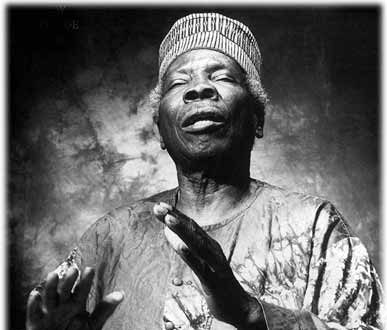Three years before Rosa Parks’ bus boycott, Nigerian drummer Babatunde Olatunji protested against racial segregation in the southern states of America. He was part of a generation of Africans who played an important role in the fight for racial justice in the US, writes the BBC
“The leaders in the 50s and 60s provide me with a great deal of inspiration,” Nigerian-American activist Opal Tometi, co-founder of the Black Lives Matter movement, told the BBC.
When Martin Luther King Jr delivered his historic I Have a Dream speech during the March on Washington 57 years ago, around 250,000 people attended the event, including prominent figures such James Baldwin, Harry Belafonte and Sidney Poitier.Among the guests was perhaps a slightly more unexpected figure – Nigerian drummer Babatunde Olatunji. Born in 1927 to a Yoruba family in Lagos state, Olatunji won a scholarship to study at Morehouse College in Atlanta in 1950.He became a pioneering drummer, releasing 17 studio albums, including his 1959 debut Drums of Passion, widely credited with helping to introduce the West to “world music”.
Despite Olatunji’s enduring musical legacy, which includes a Grammy nomination and compositions for Broadway and Hollywood, his civil rights advocacy is less well known, according to BBC article. “He was committed to social activism throughout his life,” says Robert Atkinson, who collaborated with Olatunji on his autobiography The Beat of My Drum, which was published in 2005, two years after his death.”He really deserves to be remembered more for his role as a political activist in the US civil rights movement – before it was even a movement.”
As a Morehouse student, Olatunji encountered ignorance and stereotypes about Africa and strove to educate his fellow students about the continent’s music and cultural traditions.He started playing African music at university social gatherings and gave drumming demonstrations at both black and white churches across Atlanta.
“Baba sparked a deep sense of pride among African Americans by strongly promoting images of African culture, which in a subtle but significant way, helped set in motion the currents of the early civil rights movement,” Atkinson says.At a time of state-sanctioned racial segregation in the US, Olatunji quickly became acutely aware of racism, and began organising students to challenge so-called “Jim Crow” laws in the south.In 1952, three years before Rosa Parks helped spark the Montgomery Bus Boycott in Alabama, Olatunji staged his own protests on public buses in the south.



